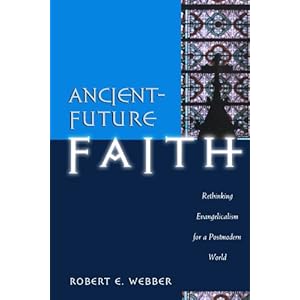One of my classes this quarter is taking an interesting tack as we are sailing the waters of Liturgical History. We're exploring and testing Robber Webber's thesis, most clearly articulated in his Ancient-Future Faith, that the second, third, and fourth centuries of the Christian church offer the closest cultural parallels to our own time; thus, we may find the best resources for renewing the church's worship today in the worship of the earliest Christians.
One of the ways we're testing that hypothesis is by learning what we know about Christian worship in those early centuries. Lots of work in primary sources, guided by a monster bibliography and Paul Bradshaw's The Search for the Origins of Christian Worship.
What we'll find I'm not yet sure. But what I'm wondering at the outset is whether or not Webber's attempt to find resources from the second, third, and fourth centuries is really because those centuries are the most similar to the twenty-first in the cultural features that matter most. Or perhaps Webber's is another of the many attempts throughout history to find in the supposedly "golden" age of the Church ground and authority for the reforms one wishes to pursue in the present day. But if that's the motivation, we should return to the practices of the earliest church as reflected in Scripture, right? Anyone want to read through Corinthians and offer some suggestions for renewing the church today? Which of the practices found there should we imitate? Widespread dissention? Drunken fights at the Eucharist? Eating meat sacrificed to idols? Incestuous marriage?
Sunday, April 02, 2006
Subscribe to:
Post Comments (Atom)











No comments:
Post a Comment